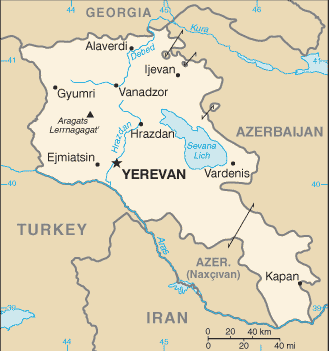|
Armenia
|

|
Capital: Yerevan
Population: 2,957,731
Brief History of Armenia:
Because Armenia is strategically located between Europe and Asia, it has been part of many of the great empires throughout the history of the world. These include the Greeks, Romans, Assyrians, Arabs, Persians, the Ottoman Empire, and the Turkish Emipire.
In 800 BC the area that is now Armenia became part of the Kingdom of Urartu. which flourished until 600 BC. At this time the Kingdom of Armenia was established under the Orontid Dynasty. Between 95 and 66 BC Tigranes the Great ruled the Kingdon of Armenia. During this time Armenia reached the peak of its power becoming a great and powerful nation.
In 301 AD, Armenia became the first country to adopt Christianity as an official state religion. The church it established still exists and is not part of either the Roman Catholic or the Eastern Orthodox churches
After being ruled by many different empires and nations, Armenia became an independent state between 1918 and 1920. However, in late 1920, the Soviet Union invaded. In 1922 Armenia was made part of Soviet Socialist Republic. With the fall of the Soviet Union, Armenia was once again able to declare its independence. It once again became an independent country on September 21, 1991.
The Geography of Armenia
Total Size: 29,800 square km
Size Comparison: slightly smaller than Maryland
Geographical Coordinates: 40 00 N, 45 00 E
World Region or Continent: Asia
General Terrain: Armenian Highland with mountains; little forest land; fast flowing rivers; good soil in Aras River valley
Geographical Low Point: Debed River 400 m
Geographical High Point: Aragats Lerrnagagat' 4,090 m
Climate: highland continental, hot summers, cold winters
Major cities: YEREVAN (capital) 1.11 million (2009), Gyumri, Vanadzor
The People of Armenia
Type of Government: republic
Languages Spoken: Armenian 97.7%, Yezidi 1%, Russian 0.9%, other 0.4% (2001 census)
Independence: 21 September 1991 (from Soviet Union)
National Holiday: Independence Day, 21 September (1991)
Nationality: Armenian(s)
Religions: Armenian Apostolic 94.7%, other Christian 4%, Yezidi (monotheist with elements of nature worship) 1.3%
National Symbol: Mount Ararat; eagle; lion
National Anthem or Song: Mer Hayrenik(Our Fatherland)
Economy of Armenia
Major Industries: diamond-processing, metal-cutting machine tools, forging-pressing machines, electric motors, tires, knitted wear, hosiery, shoes, silk fabric, chemicals, trucks, instruments, microelectronics, jewelry manufacturing, software development, food processing, brandy
Agricultural Products: fruit (especially grapes), vegetables; livestock
Natural Resources: small deposits of gold, copper, molybdenum, zinc, alumina
Major Exports: diamonds, mineral products, foodstuffs, energy
Major Imports: natural gas, petroleum, tobacco products, foodstuffs, diamonds
Currency: dram (AMD)
National GDP: $17,970,000,000
** Source for population (2012 est.) and GDP (2011 est.) is CIA World Factbook.
Back to Geography Home Page
